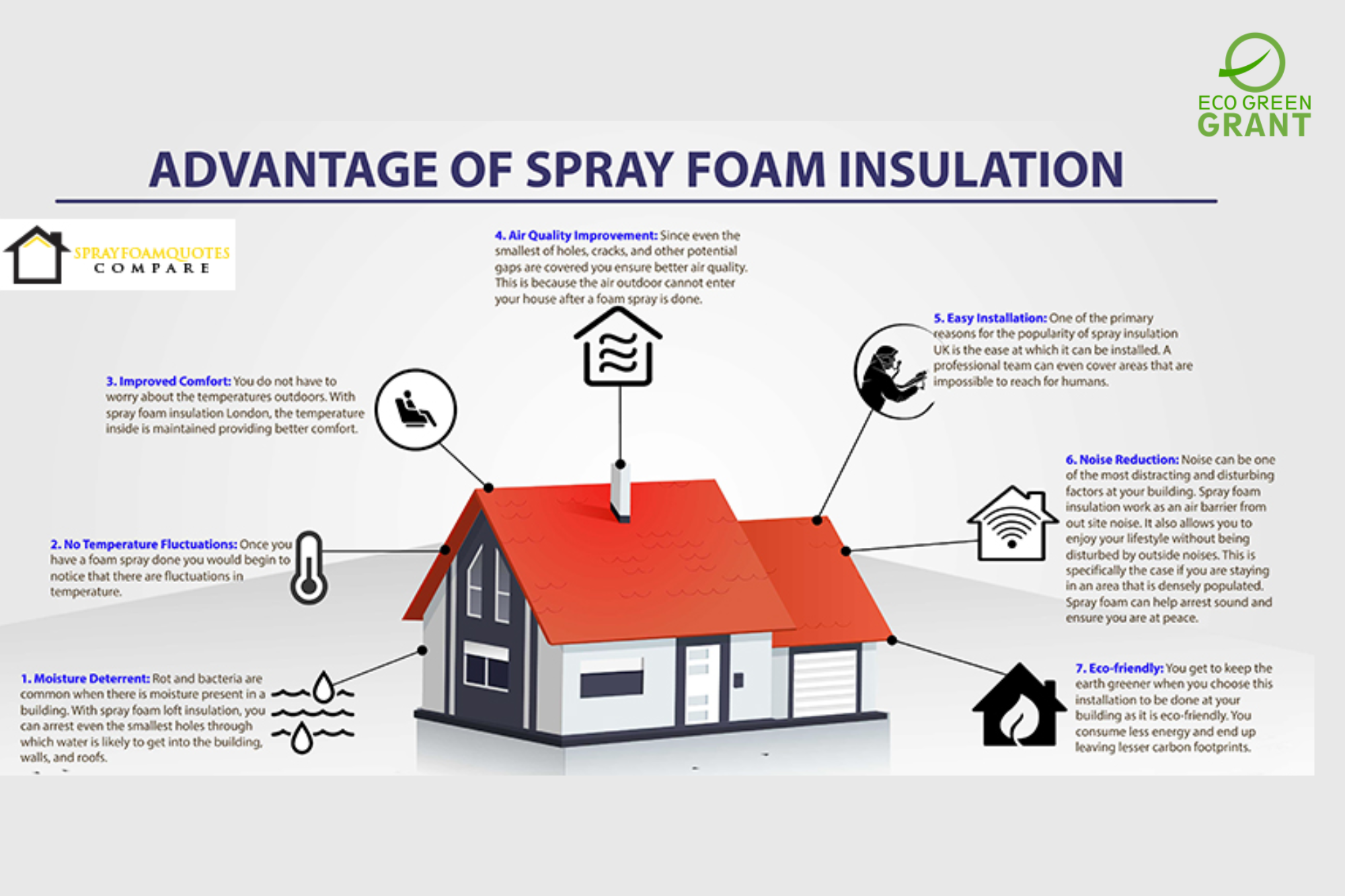Loft Insulation Grants Nottingham are financial aids provided by government programs, local councils, or energy companies to help homeowners improve the energy efficiency of their homes by installing or upgrading loft insulation. In Nottingham, these grants aim to reduce energy consumption, lower heating bills, and contribute to environmental sustainability by cutting down carbon emissions. Whether you own an older property with insufficient insulation or want to upgrade to the latest materials, securing a loft insulation grant can significantly reduce the upfront costs involved.
Loft Insulation Grants Nottinghams
Loft insulation offers a range of significant benefits that make it a smart investment for homeowners in Nottingham. Firstly, it greatly improves energy efficiency by reducing heat loss through the roof, which accounts for a substantial portion of a home’s heat escape. By keeping your home warmer in the winter and cooler in the summer, loft insulation helps lower your energy bills, saving you money month after month.
In addition to cost savings, well-installed loft insulation contributes to increased comfort throughout your living space by maintaining a more consistent indoor temperature. It also reduces your carbon footprint by minimizing the amount of energy required for heating and cooling, making it an environmentally friendly choice.
Moreover, many insulation materials can help reduce noise pollution, creating a quieter and more peaceful home environment. With these advantages combined, securing a loft insulation grant in Nottingham not only helps you afford the upfront costs but also supports a more sustainable and comfortable lifestyle.
Overview of Available Grants in Nottingham
Nottingham offers a variety of Loft Insulation Grants Nottingham aimed at helping homeowners improve their property’s energy efficiency while reducing heating costs. These grants are often provided by local councils, government schemes, and energy companies, each with specific eligibility criteria and application processes.
One of the most common programs available is the ECO (Energy Company Obligation) scheme, which targets low-income households and those receiving certain benefits. Under ECO, energy suppliers contribute funding to install energy-saving measures, including loft insulation, at little or no upfront cost to eligible residents.
In addition to ECO, Nottingham City Council occasionally runs its own initiatives or partners with organizations to provide grants or discounted insulation services. These local programs often focus on vulnerable groups such as the elderly or families living in fuel poverty.
To take advantage of these grants, it’s important to understand the requirements, such as property type, income thresholds, or previous insulation status. Many programs prioritize homes that have never been insulated or where existing insulation has deteriorated.
By exploring these available options, Nottingham homeowners can significantly reduce the cost of loft insulation upgrades, making their homes warmer and more energy-efficient while contributing to environmental sustainability. In the next sections, we’ll guide you through the eligibility criteria and step-by-step application process for these grants.
Eligibility Criteria for Loft Insulation Grants

Before applying for a loft insulation grant in Nottingham, it’s essential to understand the eligibility criteria to ensure you qualify for the assistance. Generally, these grants are designed to help low-income households, vulnerable individuals, and those living in energy-inefficient homes reduce their energy bills by improving insulation.
To be eligible, applicants often need to meet one or more of the following conditions:
Income Support or Benefits
Receiving benefits such as Universal Credit, Income Support, Pension Credit, or Jobseeker’s Allowance can make you eligible.
Low Income and Vulnerability
Households with low income that include vulnerable residents like the elderly, disabled, or young children may qualify.
Property Type
Grants typically apply to owner-occupied homes, private rentals, or social housing properties that lack adequate insulation.
Energy Efficiency
Homes with poor energy ratings or those currently under-insulated are prime candidates for loft insulation grants.
It’s worth noting that eligibility criteria may vary slightly depending on the specific grant scheme or local council policies. Therefore, checking with Nottingham City Council or approved energy providers for the latest guidelines is recommended. Meeting these criteria not only makes you eligible for financial support but also helps you contribute to a greener, more energy-efficient home.
How to Check if Your Property Qualifies
Before applying for a loft insulation grant in Nottingham, it’s essential to determine whether your property qualifies for the scheme. Eligibility criteria can vary depending on the specific grant program, but generally, the focus is on helping homeowners who are most in need of energy efficiency improvements.
First, check the age and type of your property. Many grants target properties built before a certain year, as older homes tend to have less effective insulation. For example, houses built before 2000 are often prioritized because they typically lack modern insulation standards.
Next, consider your household income or benefits status. Several grant programs are designed to assist low-income families or those receiving certain government benefits, such as Universal Credit, Pension Credit, or Child Tax Credit. Make sure to review the specific income thresholds or qualifying benefits listed by the grant provider.
You should also verify whether your loft already has adequate insulation. Most grants are aimed at properties with little to no existing insulation to maximize energy savings. If your loft insulation is below the recommended thickness—usually less than 100mm—you may be eligible.
To streamline this process, many local councils and energy companies in Nottingham offer online eligibility checkers where you can enter your postcode and some basic property information. Additionally, contacting Nottingham City Council or approved insulation installers can provide personalized advice and confirm your qualification status.
By thoroughly checking these factors beforehand, you can save time and increase your chances of successfully securing a loft insulation grant to improve your home’s energy efficiency.
Step-by-Step Application Process
Applying for a loft insulation grant in Nottingham is a straightforward process if you know the right steps to follow. Here’s a detailed, step-by-step guide to help you secure your grant with ease:
Check Your Eligibility
Before starting your application, ensure that you meet the eligibility criteria. Generally, grants are available for homeowners or tenants in specific income brackets or those receiving certain benefits. Verify your eligibility on the official Nottingham city council website or the administering body’s portal.
Gather Required Documents
Prepare all necessary documents to support your application. This typically includes proof of identity, proof of address, income or benefits statements, and details about your property. Having these documents ready will speed up the process.
Complete the Application Form
Fill out the application form carefully. This can often be done online through the official grant website or via a physical form available at local council offices. Provide all requested information accurately to avoid delays.
Submit the Application
Once your form is complete and documents are attached, submit your application as instructed. Keep a copy of your submission confirmation or receipt for your records.
Schedule an Assessment
After submitting your application, an energy assessor may contact you to schedule a visit. This assessment helps determine the current state of your loft insulation and confirms your eligibility for the grant.
Receive Approval and Installation
If your application is approved, you’ll be notified of the next steps. The grant provider will coordinate the installation of your loft insulation, often at no upfront cost to you.
Follow Up and Feedback
After installation, it’s a good idea to follow up to ensure all work has been completed satisfactorily. Providing feedback can help improve the grant program for future applicants.
By following these steps carefully, you can take full advantage of loft insulation grants available in Nottingham, helping you save on energy bills while making your home more comfortable and environmentally friendly.
Required Documentation for Grant Applications

When applying for loft insulation grants in Nottingham, having the correct documentation ready can significantly streamline the process and increase your chances of approval. Typically, grant providers require proof of identity, proof of residence, and evidence of eligibility based on income or other qualifying criteria. Commonly accepted documents include a valid photo ID such as a passport or driver’s license, a recent utility bill or council tax statement to confirm your Nottingham address, and proof of income such as payslips, benefit statements, or a tax return.
Additionally, some schemes may request details of your current energy usage or an energy performance certificate (EPC) to assess the suitability of your property for insulation. Gathering these documents before starting your application will help avoid delays and ensure a smooth, efficient grant approval process. Remember to check the specific requirements of the grant program you’re applying for, as documentation needs can vary between providers.
Finding Approved Installers in Nottingham
When it comes to securing loft insulation grants in Nottingham, one of the most important steps is finding approved installers who meet the program’s standards. Approved installers are professionals who have been vetted and certified by the grant providers, ensuring that the insulation work is carried out safely, efficiently, and to the required quality standards. Hiring an approved installer is often a mandatory condition to qualify for the grant, so it’s essential to choose carefully.
To find approved installers in Nottingham, start by visiting official websites such as the Energy Saving Trust or your local council’s energy advice pages. These platforms typically provide up-to-date lists of certified installers in your area. You can also check the TrustMark scheme, which endorses reputable tradespeople who comply with government standards.
Once you have a shortlist of installers, take the time to read customer reviews and request quotes from multiple companies. This will help you compare prices and services while ensuring you work with a trustworthy and experienced team. Additionally, don’t hesitate to ask installers about their experience with grant-funded projects and whether they will handle the grant application process on your behalf — many approved installers offer this as part of their service.
By selecting an approved installer, you not only increase your chances of successfully securing a loft insulation grant but also benefit from professional installation that will improve your home’s energy efficiency and comfort for years to come.
What to Expect During Installation
When it comes to installing loft insulation in Nottingham, knowing what to expect during the installation process can help ease any concerns and ensure a smooth experience. Once you’ve secured your grant and booked your installation date, a professional installer will visit your property to carry out the work.
The installation typically begins with an assessment of your loft space to determine the best insulation materials and methods suited to your home’s structure. The installer will then clear any debris or obstructions in the loft to prepare the area. Depending on the type of insulation—whether it’s rolled mineral wool, rigid foam boards, or blown-in insulation—the installer will carefully place the material to provide maximum thermal efficiency.
The process usually takes a few hours and is minimally disruptive. Installers will take care to protect your home, using dust sheets and ensuring the workspace is tidy. They will also check for any ventilation issues to prevent dampness or condensation after installation.
After completion, the installer will clean up the area and may provide you with advice on maintaining your new insulation. You can expect an immediate improvement in your home’s comfort and energy efficiency, often leading to noticeable savings on heating bills. Overall, the installation is straightforward, professional, and designed to enhance your home’s warmth and reduce energy costs effectively.
Common Challenges and How to Overcome Them
When applying for loft insulation grants in Nottingham, you may encounter a few common challenges that can slow down the process or even jeopardize your application. Understanding these obstacles beforehand can help you navigate them more effectively and increase your chances of success.
Eligibility Criteria Confusion
One of the most frequent issues applicants face is uncertainty about whether they qualify for the grant. Different schemes often have specific requirements based on income level, property type, or energy efficiency ratings. To overcome this, carefully review the eligibility guidelines provided by the grant provider and don’t hesitate to contact local councils or authorized agencies for clarification.
Incomplete or Incorrect Documentation
Submitting incomplete or incorrect paperwork is a major reason applications get delayed or rejected. Make sure you gather all necessary documents such as proof of income, property ownership, and energy bills before starting your application. Double-check every form for accuracy and completeness to avoid unnecessary setbacks.
Limited Awareness of Available Grants
Many residents miss out simply because they are unaware of the grants available to them. Keep yourself informed by regularly checking Nottingham City Council’s website, subscribing to local newsletters, or speaking to energy advisors in your community. Networking with neighbors who have recently undergone insulation upgrades can also provide valuable insights.
Scheduling Installation Appointments
After securing a grant, coordinating the installation can sometimes be tricky due to busy contractor schedules or unforeseen delays. To manage this, book your appointment as early as possible and maintain open communication with the service provider. Being flexible with dates and times can also help speed up the process.
By anticipating these challenges and proactively addressing them, you can streamline your loft insulation grant application and enjoy the benefits of a warmer, more energy-efficient home in Nottingham.
Additional Energy Efficiency Support Programs
In addition to loft insulation grants, Nottingham residents can take advantage of a variety of other energy efficiency support programs designed to help reduce household energy consumption and lower utility bills. These programs often provide financial assistance, expert advice, or discounted services for upgrading heating systems, installing double glazing, or improving overall home insulation. For example, schemes like the Energy Company Obligation (ECO) offer funding to eligible households for energy-saving improvements, including wall insulation and boiler replacements.
Local councils and community organizations may also run seasonal initiatives or partnerships with certified installers to make these upgrades more accessible and affordable. By exploring and combining these additional support programs with your loft insulation grant, you can significantly enhance your home’s energy efficiency, leading to greater comfort and long-term savings. Be sure to check eligibility criteria carefully and apply promptly, as many programs have limited funding available.
Tips for Maximizing Your Grant Benefits
Maximizing the benefits of your loft insulation grant in Nottingham involves more than just applying and installing the insulation. To get the most out of your grant and ensure long-term energy savings, consider these practical tips:
First, thoroughly assess your current insulation needs before applying. Sometimes, combining loft insulation with other energy-efficient upgrades, such as cavity wall insulation or draft-proofing, can significantly boost your home’s overall energy efficiency. Check if your grant provider offers additional incentives or bundled packages for multiple improvements.
Next, choose high-quality insulation materials that meet or exceed local building standards. While the grant covers costs, investing in durable and effective insulation will ensure optimal heat retention and lower energy bills over time. Work with reputable installers who are certified and experienced to guarantee proper installation, as poor workmanship can reduce the effectiveness of the insulation.
Additionally, keep detailed records of all paperwork, including your grant approval, invoices, and installation certifications. This documentation can be useful for future home improvement claims or if you decide to sell your property, as energy-efficient homes often have higher market value.
FAQs
Who is eligible for loft insulation grants in Nottingham?
Eligibility often depends on factors such as your income, household benefits, and whether your property meets certain energy efficiency criteria. Many grants target low-income households, pensioners, or those receiving specific benefits. It’s best to check with local authorities or grant providers for detailed eligibility requirements.
How do I apply for a loft insulation grant?
Applications typically involve filling out a form either online or through your local council. You may need to provide proof of eligibility, such as benefit statements or income details. Some schemes require an energy assessment before approval.
What types of loft insulation are covered under these grants?
Most grants cover standard loft insulation materials like mineral wool or fiberglass. Some schemes may also include more advanced options like spray foam insulation, depending on the provider.
How long does it take to receive the grant and complete the insulation?
The timeline can vary but generally, once your application is approved, the installation is scheduled within a few weeks. Processing times for grants can range from a couple of weeks to a few months, so it’s advisable to apply early.
Will the grant cover the full cost of loft insulation?
Many grants cover either the full cost or a significant portion of it, making insulation more affordable. However, some schemes might require a contribution from the homeowner. Always clarify the financial details before proceeding.
Can I get a grant if I already have some insulation in my loft?
Some grants are available for topping up existing insulation if it doesn’t meet current standards. An energy assessor can help determine if your loft qualifies for additional insulation.
Where can I find reliable installers for loft insulation in Nottingham?
Look for accredited installers who are registered with reputable organizations such as the National Insulation Association (NIA). Your grant provider may also recommend approved contractors.






